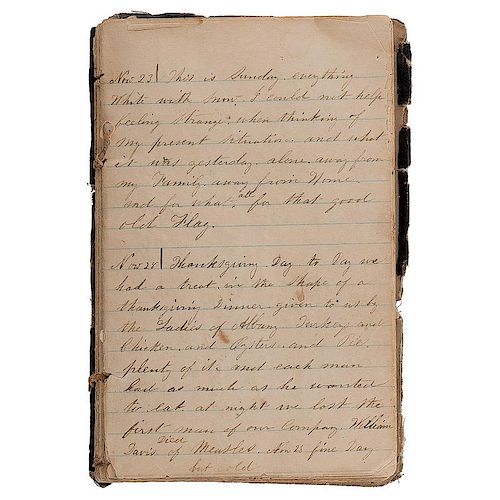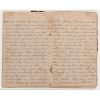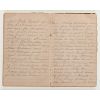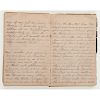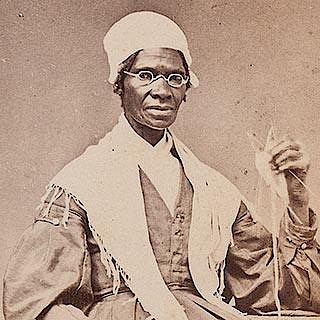Civil War New York Rocket Battalion Soldier's Diary
About Seller
6270 Este Ave.
Cincinnati , OH 45232
United States
With offices in Cincinnati, Cleveland and Denver, Cowan’s holds over 40 auctions each year, with annual sales exceeding $16M. We reach buyers around the globe, and take pride in our reputation for integrity, customer service and great results. A full-service house, Cowan’s Auctions specializes in Am...Read more
Two ways to bid:
- Leave a max absentee bid and the platform will bid on your behalf up to your maximum bid during the live auction.
- Bid live during the auction and your bids will be submitted real-time to the auctioneer.
Bid Increments
| Price | Bid Increment |
|---|---|
| $0 | $25 |
| $500 | $50 |
| $1,000 | $100 |
| $2,000 | $250 |
| $5,000 | $500 |
| $10,000 | $1,000 |
| $20,000 | $2,500 |
| $50,000 | $5,000 |
| $100,000 | $10,000 |
About Auction
Jun 9, 2017 - Jun 10, 2017
Cowan's Auctions dawnie@cowans.com
- Lot Description
Union soldier's diary written by a member of the New York Rocket Battalion, also known as General Barry's Rocket Battalion of Artillery, which was organized in Albany, NY, on December 5, 1861, and mustered into service on December 6-7, 1861. The diary, 110pp, 3.5 x 5.4 in., with entries, mostly in pencil, on every page (though not for every day) from November 23, 1861-June 29, 1862, recorded by an unidentified soldier in the New York Rocket Battalion. Entries primarily concern the movements of the battalion, including skirmishes and casualties, activities in camp, and descriptions of locations.
The battalion left New York several days later for Washington, DC, where it served until late April 1862. From May 1862 until February 1863, the battalion was stationed in North Carolina, where it participated in the Battle of New Bern and saw action at Young's Cross Roads. During its time of service with the Union Army, the battalion used eight breech-loading cannon that fired heavy rotary rockets, known as Hale Rockets after their British inventor William Hale (1797-1870). They proved to be unreliable in battle, however, and their use was discontinued. The New York Rocket Battalion was disbanded in February of 1863.
On April 12, 1862 the diarist, encamped in Washington, DC, mentioned that we are now going on our fourth month and no pay yet....to Day we got 24 new Rockett Guns. We will soon be ready to meet the enemy with them. Two days later, he reported critically on the trials of the new guns. They went and tried the Rocketts this afternoon and they proved as I expected a perfect failure. This Battalion has been a humbug all through.
The battalion departed Washington, DC, via ships for North Carolina on April 28, 1862. One vessel, the USS Oneida, was, according to the diarist, a small one and afforded the soldiers cramped quarters: the way we are stowed away in her put me in mind of a Slave Ship...we sleep in the hold amongst the hay and bags of feed but with so little room that we get to crawl around on our hands and knees. The next day, as the ship sailed down the Potomac River and passed George Washington's Mount Vernon, the diarist lashed out at the Confederates. I could not help thinking strongly of the condition of the country he periled his noble life for was in, placed in that wretched situation by a set of Double Damned traitors, who for the sake of power and gain, would send this, greatest of all countries to Destruction and sink her into oblivion.
On May 3, 1862, the battalion anchored in front of Fortress Monroe, and the diarist recorded his thoughts: the fort was the finest and largest Fort they have in the United States. It is a Beauty...while I am writing this I can count over a hundred Vessels of all kinds from Man of Wars and Gun Boats down to schooners like ours, among the rest of them lays the little Monitor under the Guns of the Fortress.
By May 7, the battalion had reached Cape Hatteras, off the North Carolina coast, where it received orders to proceed to New Bern. The next day, after reading a May 5, 1862 issue of the New York Herald, the diarist expressed hope that President Lincoln's Executive Order of February 28, restoring some commerce with Southern states, will soon bring the War to a close. God grant that it will, because it will be a benefit to all around to both North and South. On May 10, 1862, closing in on New Bern, he commented on passing a Confederate masked or disguised battery. Of course you can see it now. The Guns are on it yet....This is just the place for the Rebels to build Masked Batteries, but Burnside cleared them all out, and if you want to make them scamper let them know that Burnside is comming [sic]. His name is a terror to them. In addition to masked batteries inside of every quarter of a mile all along, there were about Thirty Boats that the Rebels sunk for a blockade to keep Burnside from getting to New Bern. As for New Bern, the diarist found it the most Beautiful little City that I have seen yet. From what I can see, the streets are thickly shaded with trees, which in comming [sic] toward it gives it a splendid appearance. The next day, his entry mentioned that before evacuating the Confederates set fire to this City. They burnt down all the Brick Buildings along the River, and up in the City all the fine Brick Buildings, and would have burnt down the whole City if Burnside had not charged on them and drove them away, and put out the fire. His May 13, 1862 entry recounted Burnside's successful campaign to capture New Bern. Burnside took this place the last of March. They had no Artillery with them. The 21st Mass. was the first to enter the City. They landed Seven Miles below the City and Marched along shore while the Gun Boats went along the River Shelling the Rebels out of their Masked Batteries. The 21st Mass. lost 40 men. They drove the Rebels to the Bridge, which crossed the River. When they got to the Bridge, they hoisted the Stars and Stripes, which deceived our Gun Boats, and gave the Rebels a chance to cross the Bridge, which they no sooner done than they set fire to it and burnt it down. They then went to Work and set fire to the City, but our troops arrived in time to prevent its total destruction.
On May 14, the battalion began artillery drills amidst a Confederate threat: This morning we commenced to Drill before Six Oclock, and kept it up till Twelve Oclock, in fact we got to Drill most all day. Artillery is very hard Work, very heavy to manage. This afternoon we had a regular old fashioned Thunder Storm, and how it did Lightning and such heavy thunder and oh how it did rain, and we had to Drill through the whole of it, and in the height of it came Marching orders at double quick, for the Rebels had drove in our Pickets only Six Miles from here, and the March had to be made through this Drenching rain. I tell you we are in a place now where we got to sleep through the night with one eye open. We do not know what moment the Rebels will be upon us.
On May 16, 1862 the diarist noted casualties resulting from a skirmish with Confederate troops at Trenton, NC. We have lost so far in our fight at Trenton 8 Privates and a Captain and a Major was shot in the Neck and Leg, but is alive yet. Two more companies of cavalry left for Trenton to Day. The Confederate threat was soon replaced by hot weather and sickness in camp. By May 24, 1862, the diarist had lost his temper after days of scorching heat and bouts of dysentery. This is a fine Morning but we are in a bad fix. Here we are Hundreds of Miles from our Homes, Most of us got the Diarrhea and no Doctor to take care of us. Our Officers are a set of mean Shit Asses, all they care for is themselves. They can't even drill us without making a Mistake and there is not a Private Soldier in the Company but what can learn them Military tactics.
The battalion and the division to which it was attached was reviewed on May 31, 1862, and recorded in the diary. To Day our Division was reviewed to Day by Gen. Burnside and the new [Military] Govn. Stanly. It was a long procession of Infantry Cavalry and Artillery. We was reviewed in the street, and then paraded through the Principle streets of the City. It made some of the Rebels look very sour, but it is no use they got to make the best of it. There was another review on June 3, 1862, and the diarist noted General Burnside's popularity with his fellow soldiers. Burnside when he goes past the Flags, always takes off his hat and bows his head in honor of them. The soldiers love him. He is a large Man, and if you want justice done you go to him.
It is unclear when the diarist left the Union Army, but his battalion was disbanded in February 1863. The diary, which offers a fascinating glimpse at camp life of an artillery soldier in North Carolina during the spring and summer of 1862, is accompanied by a handwritten transcription of sample entries.
The diary is bound in dark leather, with loss of leather at spine and lacking the front cover. Internally, the dairy appears to be intact and the paper in good condition (though the top right hand corner of every page has what appears to be a small damp stain that does not affect the text). The binding is loose and several pages are disbound.Condition
- Shipping Info
-
SHIPPING. At the request of the buyer, Cowan's will authorize the shipment of purchased items. Shipments usually occur within two weeks after payment has been received. Shipment is generally made via UPS Ground service. Unless buyer gives special instructions, the shipping method shall be at the sole discretion of Cowan's Auctions, Inc.. Cowan's is in no way responsible for the acts or omissions of independent handlers, packers or shippers of purchased items or for any loss, damage or delay from the packing or shipping of any property.
-
- Buyer's Premium



 EUR
EUR CAD
CAD AUD
AUD GBP
GBP MXN
MXN HKD
HKD CNY
CNY MYR
MYR SEK
SEK SGD
SGD CHF
CHF THB
THB